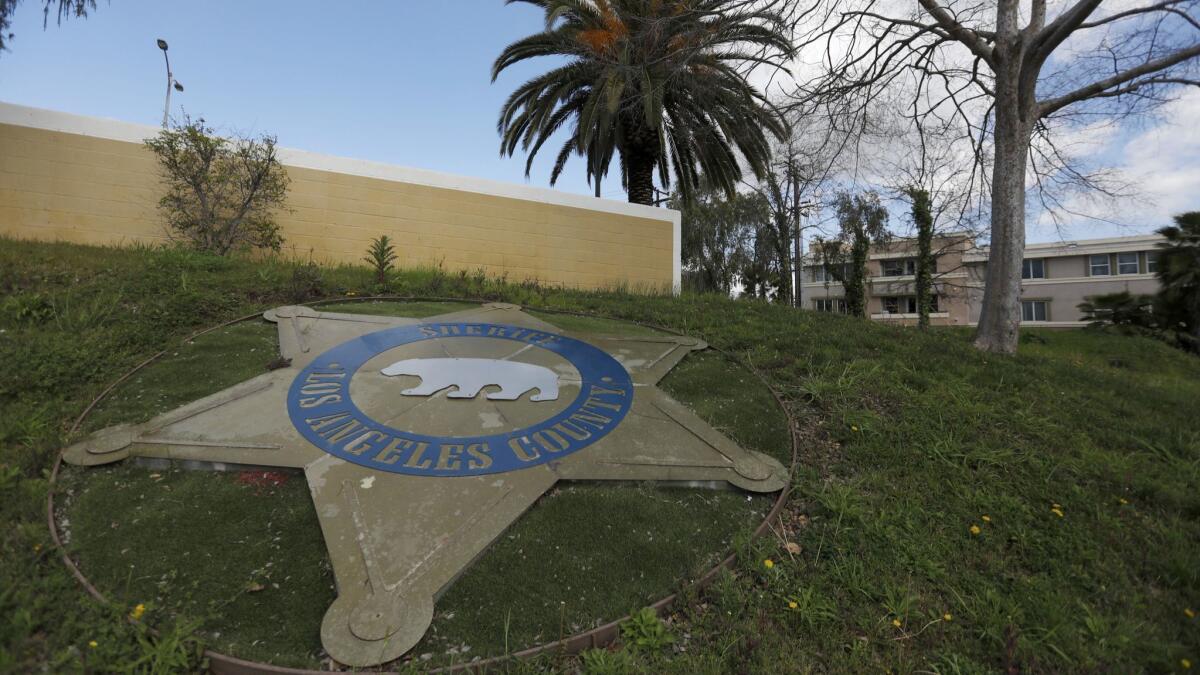Prosecutors decline to charge East L.A. lawmen in alleged hazing linked to Banditos

- Share via
Prosecutors declined to file charges against a Los Angeles County sheriff’s sergeant and three deputies who were investigated for allegedly beating four other deputies at an off-duty East L.A. station party in September 2018, records show.
In a 28-page memo released Friday, the Los Angeles County district attorney’s office said there was “insufficient evidence” that Sgt. Michael Hernandez and deputies Rafael Munoz, Gregory Rodriguez and David Silverio committed battery or any crimes.
“The evidence examined in this investigation shows that all involved individuals had consumed alcohol, the area in question was dark and unlit, many contradictory statements were made by both witnesses and the parties involved, and everyone involved has potential bias,” the memo said.
The case was investigated by the Sheriff’s Department’s Internal Criminal Investigations Bureau.
The department issued a statement saying that Sheriff Alex Villanueva “firmly believes in the legal process as well as due process” for those involved and that although the allegations did not meet the criteria to file a criminal case, they have been passed on to the Internal Affairs Bureau.
“An exhaustive administrative investigation will be conducted and discipline imposed if merited,” the department said.
Elizabeth Gibbons, an attorney representing Munoz, Rodriguez and Silverio, declined to comment other than to say, “We are looking forward to the IAB investigation where the whole story of the incident will come out.”
She said the employment status of each deputy has not changed since the department said they were placed on paid administrative leave.
The altercation happened toward the end of an off-duty party at Kennedy Hall, an event space near the East L.A. station, to celebrate the end of training for new deputies. It was shortly before 4 a.m. when a group of deputies ended up in a darkened parking lot next to the hall. By the end of the incident, one deputy, Art Hernandez, had a bloody lip and was possibly rendered unconscious and a second, Oscar Escobedo, had a sore neck, the memo said.
Prosecutors said there were several different accounts of what happened. No surveillance footage or cellphone video was recovered. The subjects of the investigation declined to be interviewed by sheriff’s investigators. Several other off-duty employees provided statements and 21 deputies identified as possible witnesses declined to be interviewed, the memo said.
The incident also came up in a civil lawsuit filed against Los Angeles County in September by eight Los Angeles County sheriff’s deputies who said they were routinely harassed by the Banditos, a clique of predominantly Latino deputies who wear tattoos of a skeleton with a sombrero, bandoleer and pistol. Its members’ monikers include “the Godfather,” “Big Listo” and “Bam Bam,” according to the lawsuit.
The district attorney’s memo referenced the Banditos, which prosecutors said was associated with a group of more senior deputies that ostracized younger deputies they felt were lazy.
“At no point in this investigation did any witnesses indicate that the ‘Banditos’ were equivalent to a gang or any type of criminal enterprise,” the memo said.
The civil lawsuit, however, has accused members of the group of repeatedly denying backup to the plaintiff deputies on dangerous calls, pressuring them to quit or leave the station, sending hostile messages on work computers, overloading them with calls at the end of their shifts and denying them overtime, going back to 2016.
The Times reported in July that the FBI was investigating the Banditos along with similar gang-like groups elsewhere within the Sheriff’s Department. In interviews with several deputies, FBI agents have asked about the inner workings of the Banditos and the group’s hierarchy, sources have said.
The county Office of Inspector General is also seeking to investigate secret societies of deputies at several stations who wear matching tattoos. The groups have been accused of committing abuses against jail inmates, fellow deputies and while on patrol. Some deputies, though, have defended the societies and the tattoos they share simply as a show of camaraderie and a way to boost morale.
L.A. County has hired the nonprofit Rand Corp. to study deputy subgroups and examine the broader climate and culture within the Sheriff’s Department.
Villanueva said in January that the department is putting a policy in place that prohibits the formation and membership of cliques that “harm the organization or harm the community.”
“We’re doing everything we can legally do,” he said.
The Banditos are accused by other deputies of using gang-like tactics to recruit young Latino deputies into their fold and retaliating against those who rebuff them.
Vincent Miller, an attorney representing the plaintiffs in the civil lawsuit, said prosecutors never interviewed his clients, relying instead on the Sheriff’s Department, whose investigators he accused of intentionally sending over a weak case.
“It’s basically more of the same — Villanueva sending a message to the deputy gangs, they’re not gonna be held accountable for their actions,” Miller said. “The D.A. is basically serving as a mouthpiece of the Sheriff’s Department.”
As part of the civil lawsuit, Miller plans to demand the agency make changes to what he called the systemic abuse of trainees.
“This is about a corrupt, systemically corrupt department,” Miller said. “We’re demanding that the county make wholesale changes.”
More to Read
Sign up for Essential California
The most important California stories and recommendations in your inbox every morning.
You may occasionally receive promotional content from the Los Angeles Times.











